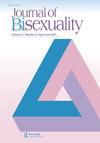结构性耻辱和双性恋+人:意大利Zan法案的否决对少数民族压力和心理健康的影响
IF 1.9
Q2 SOCIAL SCIENCES, INTERDISCIPLINARY
引用次数: 3
摘要
抽象双性恋 + 人们会经历与负面心理健康结果相关的严重形式的结构性污名。为了根除针对LGBTQIAPK的仇恨犯罪 + 2020年11月4日,意大利副总统亚历山德罗·赞提出了一项题为“防止和打击基于性别、性取向、性别认同和残疾的歧视和暴力的措施”的法案(也称为“赞法案”)。2021年10月27日,意大利参议院宣布该法案无效。这项研究旨在探讨在赞比尔被拒前后,双性恋者的心理健康状况是否恶化 + 人299名意大利双性恋者的数据 + Zan法案被否决后的人们与381名意大利双性恋者的相同测量数据进行了比较 + 赞比尔被拒绝之前的人们。我们观察到,在赞法案被拒绝后,歧视、预期和内化的消极性、韧性、焦虑和抑郁的程度有所恶化。两组人的直率程度没有变化。研究结果表明,对赞恩法案的拒绝对意大利双性恋者的幸福感产生了强烈影响 + 人本文章由计算机程序翻译,如有差异,请以英文原文为准。
Structural Stigma and Bisexual + People: Effects of the Rejection of the Zan Bill in Italy on Minority Stress and Mental Health
Abstract Bisexual + people experience severe forms of structural stigma that are associated to negative mental health outcomes. In order to eradicate hate crimes against LGBTQIAPK + people, on the 4th of November 2020, the Italian deputy Alessandro Zan proposed a Bill entitled “Measures to prevent and combat discrimination and violence on grounds of sex, gender, sexual orientation, gender identity and disability” (also known as “Zan Bill”). On October 27, 2021, the Italian Senate silenced the Bill. This study aimed to explore whether a worsening in mental health before and after the Zan Bill’s rejection occurred among bisexual + people. Data from 299 Italian bisexual + people after the Zan Bill’s rejection were compared with data on the same measures from 381 Italian bisexual + people before the Zan Bill’s rejection. We observed a worsening in the levels of discrimination, anticipated and internalized binegativity, resilience, anxiety, and depression after the rejection of the Zan Bill. Outness remained unchanged in the two groups. Results suggested that the rejection of the Zan Bill has had a strong effect on the well-being of Italian bisexual + people.
求助全文
通过发布文献求助,成功后即可免费获取论文全文。
去求助
来源期刊

Journal of Bisexuality
SOCIAL SCIENCES, INTERDISCIPLINARY-
CiteScore
2.60
自引率
17.60%
发文量
32
期刊介绍:
The Washington Quarterly (TWQ) is a journal of global affairs that analyzes strategic security challenges, changes, and their public policy implications. TWQ is published out of one of the world"s preeminent international policy institutions, the Center for Strategic and International Studies (CSIS), and addresses topics such as: •The U.S. role in the world •Emerging great powers: Europe, China, Russia, India, and Japan •Regional issues and flashpoints, particularly in the Middle East and Asia •Weapons of mass destruction proliferation and missile defenses •Global perspectives to reduce terrorism
 求助内容:
求助内容: 应助结果提醒方式:
应助结果提醒方式:


